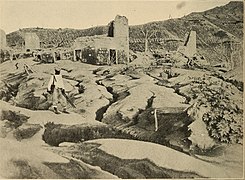History of Saint Vincent and the Grenadines
This article needs additional citations for verification. (February 2013) |
Pre-colonial history
Before the arrival of Europeans and Africans in the 16th century, various
By the time Christopher Columbus passed near St. Vincent on his third voyage in 1498, the Caribs occupied the island after displacing the Arawaks a few centuries earlier.
Early European contacts

Columbus and the Spanish
Carib Indians aggressively prevented
French and British colonisation and the Carib Wars
The first Europeans to occupy St. Vincent were the French. However, following a series of wars and peace treaties, the islands were eventually ceded to the British. While the English were the first to lay claim to St. Vincent in 1627, the French (centred on the island of Martinique) would be the first European settlers on the island when they established their first colony at Barrouallie on the Leeward side of St. Vincent in 1719.[3] The French settlers cultivated coffee, tobacco, indigo, corn, and sugar on plantations worked by African slaves.
St. Vincent was ceded to Britain by the Treaty of Paris (1763). From 1763 until independence, St. Vincent passed through various stages of colonial status under the British.
Friction between the British and the Caribs led to the
A representative assembly was authorized by the British in 1776. France
The
Like the French before them, the British also used African slaves to work plantations of sugar, coffee, indigo, tobacco, cotton and cocoa. Decades after the success of the
A
The
-
Depiction of treaty negotiations between Black Caribs and British authorities on the Caribbean island of Saint Vincent in 1773 (1910)
-
Joseph Chatoyer, the chief of the Black Caribs in St.Vincent, in an 1801 engraving
-
Engraving 'after Agostino Brunias' (ca 1801) entitled A Negro Festival drawn from Nature in the Island of St Vincent. National Maritime Museum, Greenwich
-
"View of the botanic garden in St Vincent", from "An account of the botanic garden in the island of St Vincent, from its first establishment to the present time" by Lansdown Guilding. Glasgow: Richard Griffin & Company, 1825
-
Bunkers Hill, Richmond Estate, Saint Vincent. May 30, 1902 This ridge, near the Wallibou river, shows the dendritic drainage system gradually creeping to crest of the ridge. Material along crest is fine dust, which rains formed into a cement-like coat.
-
Barrouallie, tent camp for people displaced by the 1902 eruption of the Soufrière
Self-rule and independence

St. Vincent was granted associate statehood status on 27 October 1969, giving it complete control over its internal affairs. Following a referendum in 1979, St. Vincent and the Grenadines became the last of the Windward Islands to gain independence on 27 October 1979.
In November 2020,
Natural disasters
Natural disasters have plagued the country throughout the 20th century. In 1902,
The island also suffers from hurricanes. On 11 September 1898, six hours of a terrible hurricane devastated Barrouallie, which was almost completely destroyed. More recently, in 1980 and 1987, hurricanes devastated banana and coconut plantations; 1998 and 1999 also saw very active hurricane seasons, with Hurricane Lenny in 1999 causing extensive damage to the west coast of the island.
In 2021, on 9 April, the La Soufrière volcano erupted, sending ash several miles into the atmosphere. Approximately 16,000 people were evacuated in the days leading up to the eruption.[5]
See also
- British colonization of the Americas
- French colonization of the Americas
- History of the Americas
- History of the British West Indies
- History of North America
- History of the Caribbean
- List of prime ministers of Saint Vincent and the Grenadines
- Politics of Saint Vincent and the Grenadines
- Saint Vincent and the Grenadines
- Spanish colonization of the Americas
References
- ^ Forte, Maximilan (June 2014). "Yurumein (Homeland): A Documentary on Caribs in St. Vincent". Review of the Indigenous Caribbean.
- ^ Rogozinski (January 2000), A Brief History of the Caribbean: From the Arawak and Carib to the Present. Plume, New York, New York.
- ^ "St. Vincent Timeline". St. Vincent Genealogy Resources. Archived from the original on 7 October 2011. Retrieved 9 November 2011.
- ^ "Ralph romps to fifth straight election win in St Vincent and the Grenadines". jamaica-gleaner.com. 5 November 2020.
- ^ Wilson Wong, The Associated Press (9 April 2021). "Explosive eruption rocks volcano on Caribbean's St. Vincent". NBC News.
Further reading
- Gonsalves, Ralph E. 2007. History and the Future: A Caribbean Perspective. Kingstown, St. Vincent: Quik-Print.
- OL 23272543M.
- Rogozinski, January 2000. A Brief History of the Caribbean: From the Arawak and Carib to the Present. New York, New York: Plume.
- Williams, Eric. 1964. British Historians and the West Indies, Port-of-Spain: P.N.M. Publishing.






